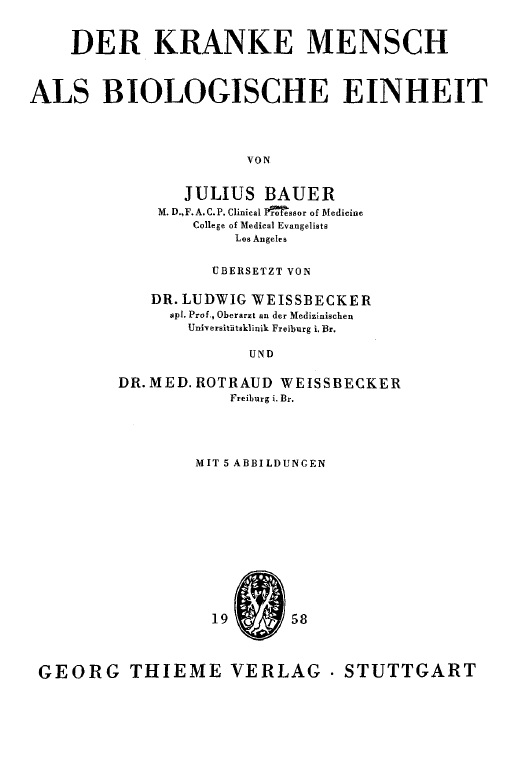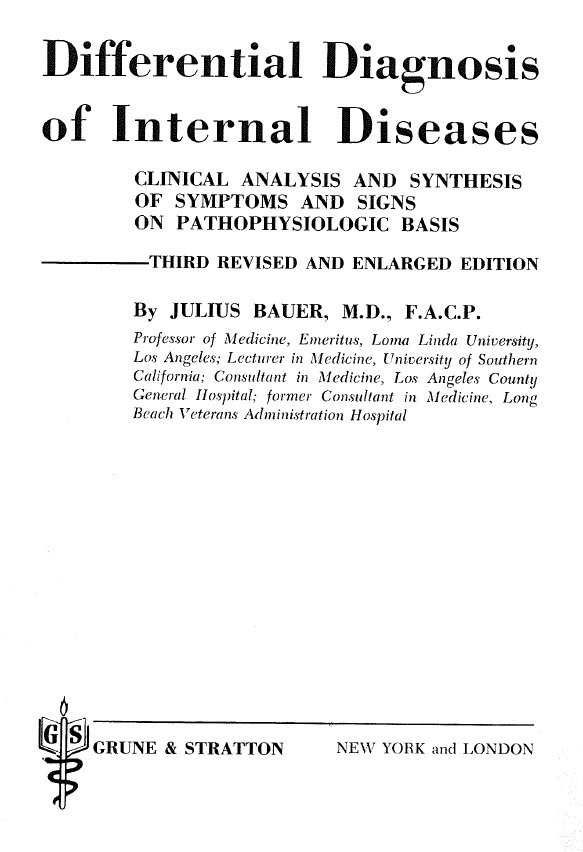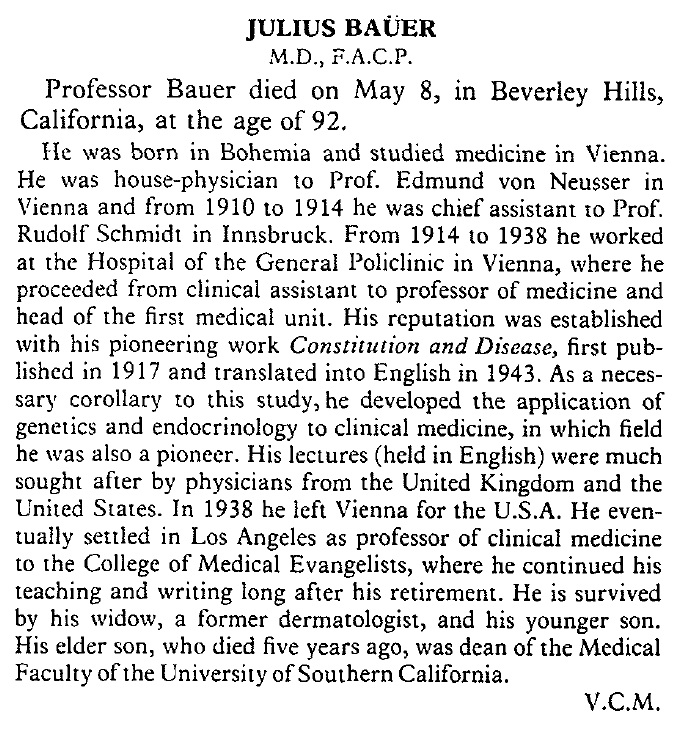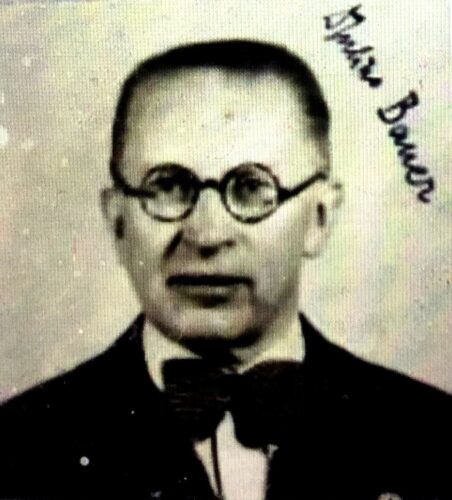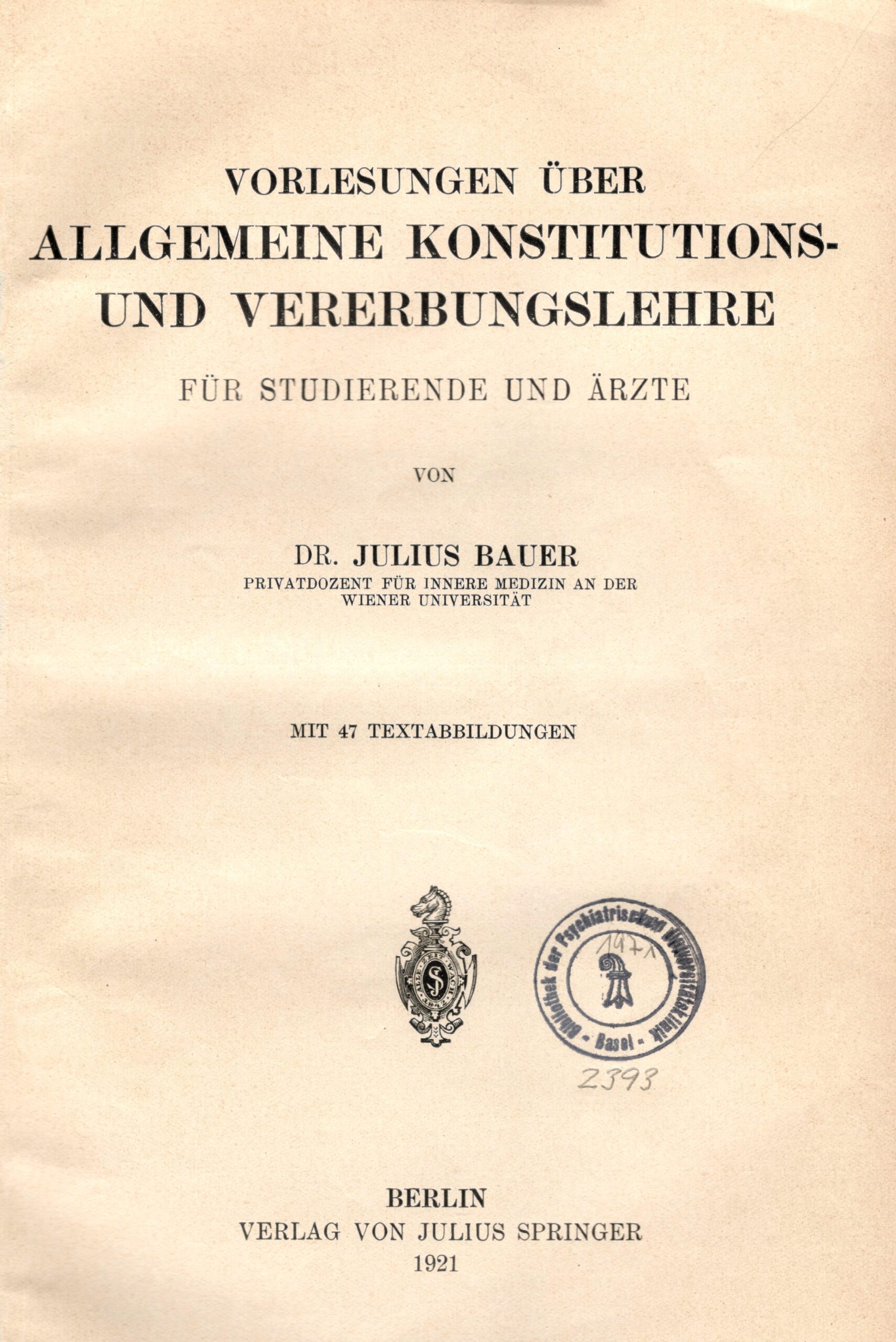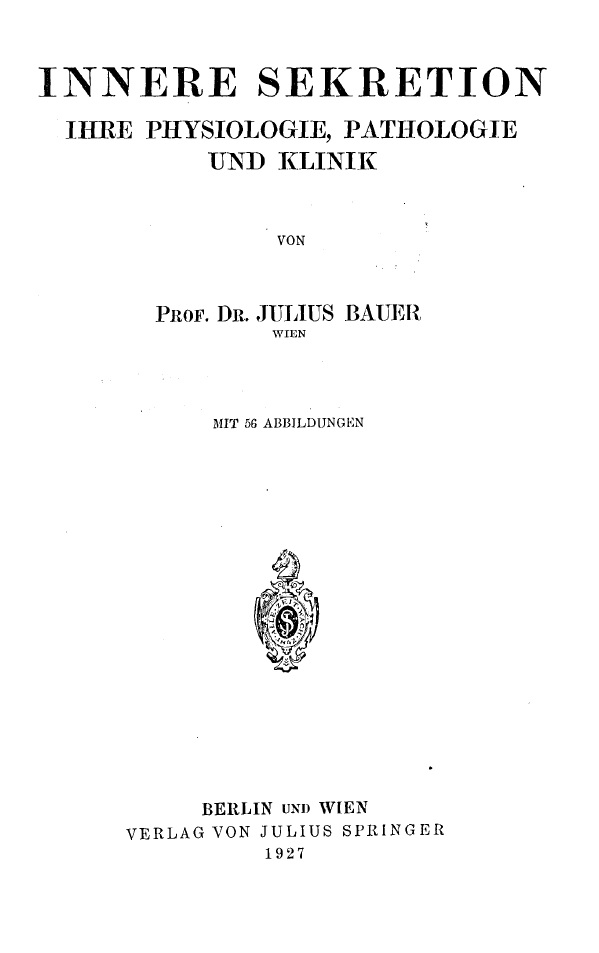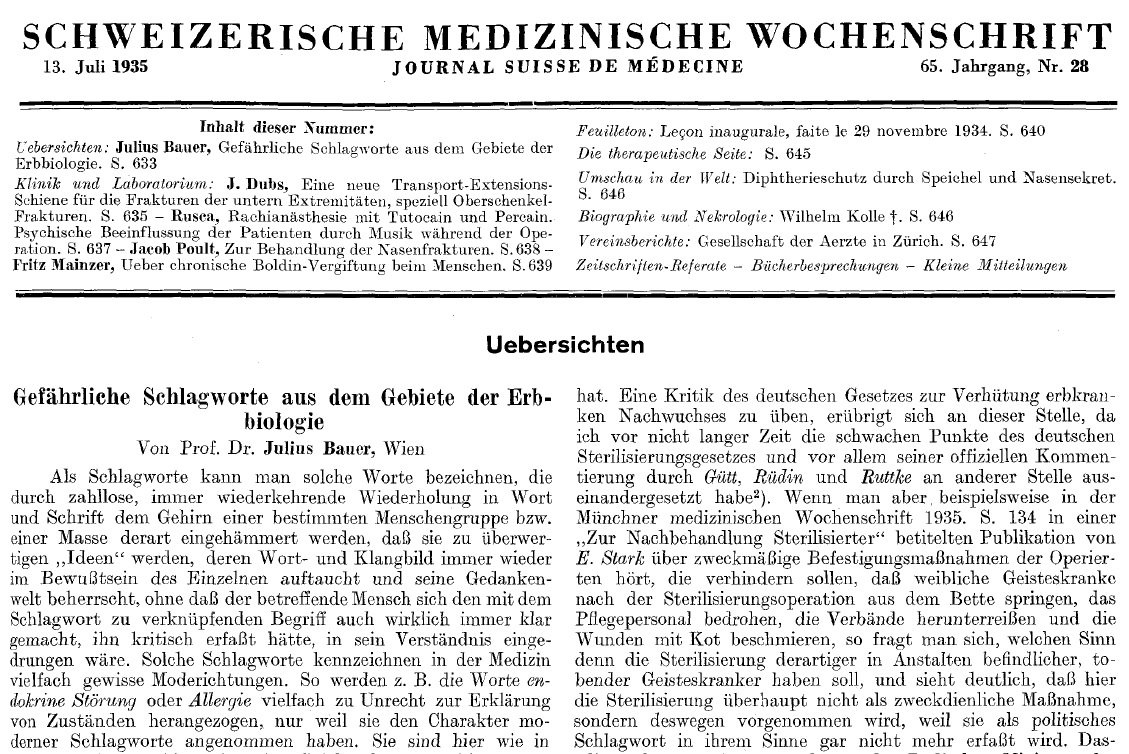Prof. Dr. med. Julius Bauer
- Nachod in former Böhmen/now Náchod, Tschechien, 14.11.1887
- Beverly Hills, California, USA , 08.05.1979
- Member since 1925
- Escaped to the USA in 1938
- Specialist in internal medicine
Julius Bauer was born into the Jewish family of the lawyer Ludwig Bauer and his wife Clara, née Schur, in Nachod, Bohemia, today Náchod, Czech Republic, in 1887.
Education and Workplaces
After attending school and passing his school-leaving exams, Julius Bauer began studying medicine at the University of Vienna in 1905. During his studies, Bauer became interested in the fields of neurology and psychiatry as well as internal medicine at an early stage. He received his doctorate in Vienna in 1910. Bauer was particularly impressed by the internist Adolf von Strümpell, who briefly headed the III Medical Department of the Vienna General Polyclinic in 1909/1910 before moving to the University of Leipzig. For a short time Bauer worked at the II Medical University Clinic in Vienna with the internist Edmund Neusser. He followed the internist Rudolf Schmidt to the Medical University Clinic in Innsbruck in 1911, where he researched metabolic diseases, mainly thyroid diseases (cretinism) and disorders of the autonomic nervous system. Bauer returned to Vienna in 1913 and went to Paris on a scholarship, where he worked in various clinics and at the Pasteur Institute. His encounters with Fernand Widal, Anatol Chauffard, who researched liver diseases, and the neurologist Joseph Babinski date from this time. Back in Vienna, Bauer became assistant physician to Julius Mannaberg at the First Medical Department of the Vienna General Polyclinic. Mannaberg, a pupil of Hermann Nothnagel, was an internist who dealt in particular with infectious diseases.
During the First World War Bauer was a “Landsturmpflichtiger Zivilarzt” (civilian doctor liable to military service) at the military hospital of the Vienna Polyclinic. He habilitated and was appointed private lecturer in internal medicine at the Vienna Medical Faculty in 1919. Bauer had submitted 50 scientific papers by this time. The first edition of his work “Konstitutionelle Disposition zu inneren Krankheiten” was published in 1917 and saw its third edition in 1924. His “Vorlesungen über allgemeine Konstitutions- und Vererbungslehre” were published in 1921. In addition to this topic, Bauer continued to work intensively on questions in the field of endocrinology. He also published on the problem of ulcer disease. He was appointed associate professor at the Vienna Medical Faculty in 1926. He published his textbook “Innere Sekretion, ihre Physiologie, Pathologie und Klinik” with Julius Springer in 1927.
He was appointed Medical Director of the III Medical Department of the Vienna General Polyclinic in 1928. He gave the keynote lecture Endogene Fettsucht (Endogenous Obesity) alongside Siegfried Thannhauser during the 9th conference of the Gesellschaft für Verdauungs- und Stoffwechselkrankheiten (Society for Digestive and Metabolic Diseases) in Berlin in 1929. He was closely associated with this specialist society. He had been a member since 1925 and belonged to the committee of the society from 1925 to 1933.
Julius Bauer took over the management of the First Medical Department of the Vienna Polyclinic following the death of Julius Mannaberg in 1931 and gathered a large group of scientifically active assistants around him who dealt with questions from endocrinology, haematology and genetics. Bauer visited the USA in 1923, 1928 and 1930 to give lectures. He was able to meet the German-American physiologist and gastroenterologist John C.-Hemmeter at Johns Hopkins University in Baltimore and the diabetologist Elliott P. Joslin in Boston.
After 1933
Bauer published his unequivocal criticism of Nazi racial ideology, the hereditary biology advocated in Germany and the Nazi law “Zur Verhütung erbkranken Nachwuchses” in the Schweizer Medizinische Wochenschrift in 1935. This article triggered numerous fierce anti-Semitic attacks on Bauer that had been written by Nazi medical representatives. In this context, Bauer’s membership in the German Society for Internal Medicine was withdrawn. The letter was signed by Alfred Schwenkenbecher, chairman of the DGIM in 1935/36 ( Bauer had until then been an informal representative of Austria on the committee of the DGIM ). In addition, Bauer’s participation in the International Training Days in Montreux was no longer possible. The German doctors’ representatives had threatened to boycott the training days.
At the First Medical Department of the Vienna General Polyclinic, Bauer established regular internal medicine-clinical “Saturday Demonstrations” from 1932 onwards, which met with a broad response and quickly became an institution for further training. Ismar Boas also attended in 1937, after he had fled from Berlin to Vienna.
Following the invasion of Austria by the German Wehrmacht in March 1938, Bauer’s authorisation to teach at the Vienna Medical Faculty was revoked as of 21 April 1938. The then acting dean and anatomist Eduard Pernkopf signed the corresponding letter. Julius Bauer was removed from his post at the Vienna General Polyclinic the following day. At least eight of his scientifically active colleagues at the Vienna Polyclinic lost their positions at the same time. They had worked on endocrinology, haematology and genetic research and had to flee to the USA or England.
Julius Bauer left Vienna with his wife and son (his second son studied in Geneva) in April 1938 and lived in Paris for the next eight months. He arrived in the USA with his family at the end of December 1938. Bauer obtained a salaried full-time position as visiting professor at the medical department of the Louisiana State University Medical School, New Orleans. He moved to Los Angeles in 1940, became clinical professor of medicine at the College of Medical Evangelists (later Loma Linda University), worked as a consultant in medicine at Los Angeles County General Hospital and was a consultant in medicine at the Long Beach Veterans Administration Hospital, LA. After passing the California State Medical Examination, he was licensed to practice medicine. From then on he also had a private practice. He was granted US citizenship in 1944.
Julius Bauer is one of those who, after fleeing to the USA, were able to continue to be active in science and publishing and found opportunities to pursue their research interests. Bauer became emeritus professor in 1961 at the age of 74. He continued to participate in teaching medical students at the University of Southern California as a lecturer in medicine.
Julius Bauer died in Beverly Hills, California, on 8 May 1979 at the age of 91.
Biography translated by Rachel Hinterthan-Nizan
Sources and Further Reading
Sources